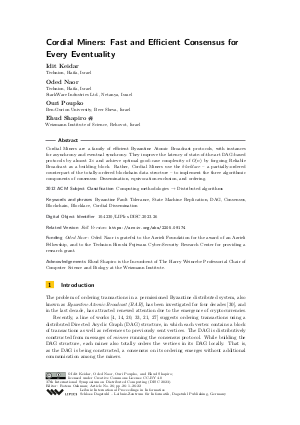@InProceedings{keidar_et_al:LIPIcs.DISC.2023.26,
author = {Keidar, Idit and Naor, Oded and Poupko, Ouri and Shapiro, Ehud},
title = {{Cordial Miners: Fast and Efficient Consensus for Every Eventuality}},
booktitle = {37th International Symposium on Distributed Computing (DISC 2023)},
pages = {26:1--26:22},
series = {Leibniz International Proceedings in Informatics (LIPIcs)},
ISBN = {978-3-95977-301-0},
ISSN = {1868-8969},
year = {2023},
volume = {281},
editor = {Oshman, Rotem},
publisher = {Schloss Dagstuhl -- Leibniz-Zentrum f{\"u}r Informatik},
address = {Dagstuhl, Germany},
URL = {https://drops.dagstuhl.de/entities/document/10.4230/LIPIcs.DISC.2023.26},
URN = {urn:nbn:de:0030-drops-191525},
doi = {10.4230/LIPIcs.DISC.2023.26},
annote = {Keywords: Byzantine Fault Tolerance, State Machine Replication, DAG, Consensus, Blockchain, Blocklace, Cordial Dissemination}
}

 Creative Commons Attribution 4.0 International license
Creative Commons Attribution 4.0 International license

































